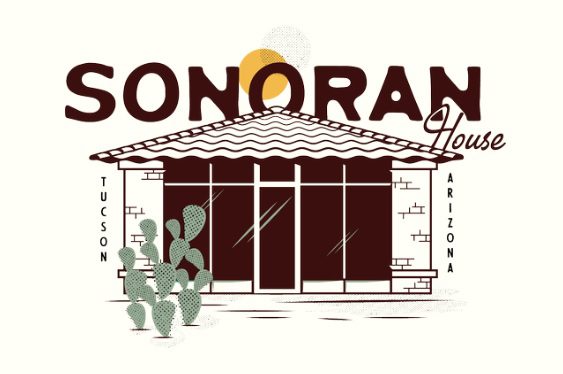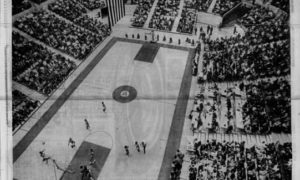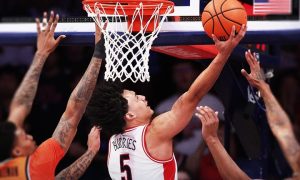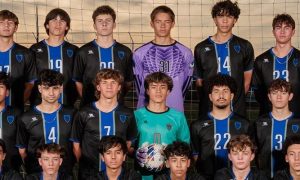FOLLOW @JAVIERJMORALES ON TWITTER!
[rps-paypal]
[ezcol_1half id=”” class=”” style=””]

TABLE OF CONTENTS:
— General history
— J.F. “Pop” McKale
— The games
— Comparisons then and now
— Wildcats nickname
— Military service
— Rankings
— The players
[/ezcol_1half]
[ezcol_1half_end id=”” class=”” style=””]
Clipping of actual L.A. Times article published Nov. 8, 1914
Excerpt from L.A. Times, Nov. 8, 1914, authored by Bill Henry:
“Arizona’s cactus-fed athletes, despite heroic efforts on the part of their two halfbacks, (Asa) Porter and (Franklin) Luis, went down to defeat before the Occidental Tigers yesterday afternoon, the tally with all precincts heard from being 14 to 0 in favor of the Tigers.
Confident of rolling up a big score, the Tigers took the field with grins on their faces, but before the game was 10 seconds old they knew they had a battle on their hands.
The Arizona men showed the fight of wild cats and displayed before the public gaze a couple of little shrimps in the backfield who defied all attempts of the Tigers to stop them.”This site will conduct a countdown in a 100-day period, leading up to Arizona’s 2014 football season-opener with UNLV on Aug. 29 at Arizona Stadium. The 100 Days ‘Til Kickoff countdown will include information daily about the historic 1914 Arizona team that helped create the school’s nickname of “Wildcats” because of how they played that fateful day against Occidental.
[/ezcol_1half_end]
[ezcol_1half id=”” class=”” style=””]

Occidental coach Joseph Pipal deemed it more necessary to scout Pomona rather than coach against Arizona when the Varsity played his Tigers in 1914
The college football hierarchy on the West coast in 1914 was not USC and UCLA. Occidental and Pomona (Calif.) were two of the bigger programs followed by Whittier College. USC was next. UCLA did not field a football team until 1919.
California and Stanford, fearful of the rash of devastating football-related injuries in that era, kept to rugby.
The fact that Arizona could swing a series with Occidental (the Tigers beat Arizona 28-0 in Tucson in 1913) was a minor victory in itself for the Varsity.
It’s the equivalent of the Wildcats playing USC today. Heading into the 1914 season, Occidental was coming off two California championships with consecutive unbeaten seasons.
[/ezcol_1half]
[ezcol_1half_end id=”” class=”” style=””]
THE LAST WEEK IN THE SERIES:
— No. 9: Varsity’s busy pregame preparation against Occidental includes reading letters from co-eds
— No. 10: Enthusiastic Varsity travels to Los Angeles to face Occidental
— No. 11: Tribute to 1914 team members in lingo of that generation
— No. 12: 1914 team member Condron one of Tucson’s historic developers
— No. 13: Sadness overcomes campus with star’s accidental death
— No. 14: Top 14 reasons why 1914 Arizona football team important to program’s history
— No. 15: Varsity member created idea of “A” Mountain 100 years ago
[/ezcol_1half_end]
The Tigers, who defeated USC 20-13 the week before hosting Arizona, featured a bruising, physical team under coach Joe Pipal that could run exclusively or mix it up with a pass from quarterback Pete Lenz. Against the Trojans, Occidental did not attempt a pass.
One of Occidental’s best players on the team was a dominating tackle — Arthur “Battle” Shipke — a consensus All-California selection that season. Sam McClung, an elusive halfback, was also a consensus choice.

The 1914 Arizona football team that earned the honor of being named the first “Wildcats” was composed of (front row, left to right): Verne La Tourette, George Seeley, Leo Cloud, Richard Meyer, Asa Porter. Second row: Franklin Luis, Lawrence Jackson, Ray Miller, J.F. “Pop” McKale (coach), Turner Smith, Harry Hobson (manager), Orville McPherson, Albert Crawford, Ernest Renaud. Back row: Albert Condron, Emzy Lynch, Charley Beach, Vinton Hammels, Bill Hendry, George Clawson, Harry Turvey.
(AllSportsTucson.com graphic/Photo from University of Arizona Library Special Collections)
[ezcol_1half id=”” class=”” style=””]
What they were talking about on this day in 1914
Friday, Aug. 21, 1914
In Nogales, Sonora, an order from Pancho Villa is made to halt further warlike action by Governor Jose Maria Maytorena brought hope of peace in Sonora provided the Yaqui Indians, the supporters of Maytorena, can be controlled. Villa’s order was the result of a declaration by Colonel Plutarco Elías Calles that he is willing to remain quiet if Maytorena will discontinue hostilities. Calles’ troops are encamped 15 miles east of Nogales and Maytorena’s 30 miles south. The two leaders await the coming of Villa and Álvaro Obregón as special commissioners to settle the differences. Obregón telegraphed that he would leave Mexico City immediately and arrive in Sonora in a few days and begin the work of mediation.
[/ezcol_1half]
[ezcol_1half_end id=”” class=”” style=””]
[/ezcol_1half_end]
“Coach Pipal has been spending the week on fast, light workouts,” the Los Angeles Times reported the night before the Arizona game. “The Tigers have fully recovered from the minor bruises of the USC battle.
“If Arizona plays an open (passing) game, Coach Pipal will probably have the Tigers open up. In spite of the fact that USC was bucked to defeat, the Tigers are an open field team.”
Pipal, who wrote a book about executing the lateral pass in 1928, was not around to observe the Tigers’ versatility against Arizona. He prioritized scouting Pomona (Occidental’s next opponent) against Whittier the same day the Varsity played his Tigers. He left the coaching of the team to captain Sid Foster, the starting left halfback.
At that time, teams only had a head coach and a manager. No assistants. No scouts. Pipal, later a coach at Oregon State in 1916 and 1917, reportedly considered J.F. “Pop” McKale’s team practice fodder.
“Joe Pipal took a long chance when he went to Pomona and left his team without his guiding hand on the sidelines, for the Papal-less Tigers had an awful time beating their lighter antagonists,” Los Angeles Times reporter Bill Henry wrote in his game story.
The account of Pipal’s snub in Arizona’s Desert Yearbook, which was penned by Varsity end Albert Condron, was described this way:
“After a warm-up, the Wild Cats and the Tigers lined up to tear at each other, our men all determined to ‘do or die’ and the Oxy friends to have ‘just a little practice’ in the absence of their scouting coach, who for other more difficult conquests, had left his cares to his hero, Capt. Foster. The game had no more than commenced until Capt. Foster had a long look of distress and worry, for our boys were fighting like genuine Wild Cats.”
Tomorrow: The historic Arizona-Occidental game begins.
ALLSPORTSTUCSON.com publisher, writer and editor Javier Morales is a former Arizona Press Club award winner. He also writes articles for Bleacher Report and Lindy’s College Sports.





























